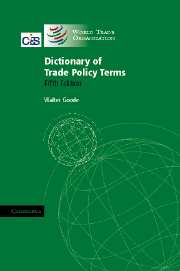Summary
Fabric formation rule: see fabric forward rule.
Fabric forward rule: a rule of origin much favoured by the United States. The rule says that some specified fabrics and made-up non-apparel articles (e.g. flat goods) are deemed to originate in the country where the fabric is woven, knitted or otherwise formed, regardless of any further finishing which may have been performed on the fabrics afterwards. The reasoning behind this rule is the assumption that fabric formation is the most important step in the production of such goods. See also yarn forward rule.
Facilitation payments: another name for bribes. See also trade and illicit payments.
Factor proportion theory: see Heckscher-Ohlin theorem.
Failing-firm doctrine: a doctrine established under United States and some other antitrust-laws. It permits mergers that might otherwise be illegal, if some conditions are met. These usually are (a) a grave possibility of a business failure, (b) a lack of any other prospective buyer and (c) a small chance for a successful reorganization of the firm. See also crisis cartel.
FAIR Act: see Federal Agriculture Improvement and Reform (FAIR) Act.
Fair and equitable treatment: an obligation found in Article XVII (State Trading Enterprises) of the GATT concerning the conduct of state trading in relation to government import purchases. This obligation does not have the same force as most-favoured-nation treatment, but it was originally meant to give non-discriminatory treatment to the maximum extent possible.
- Type
- Chapter
- Information
- Dictionary of Trade Policy Terms , pp. 170 - 184Publisher: Cambridge University PressPrint publication year: 2007
- 1
- Cited by



